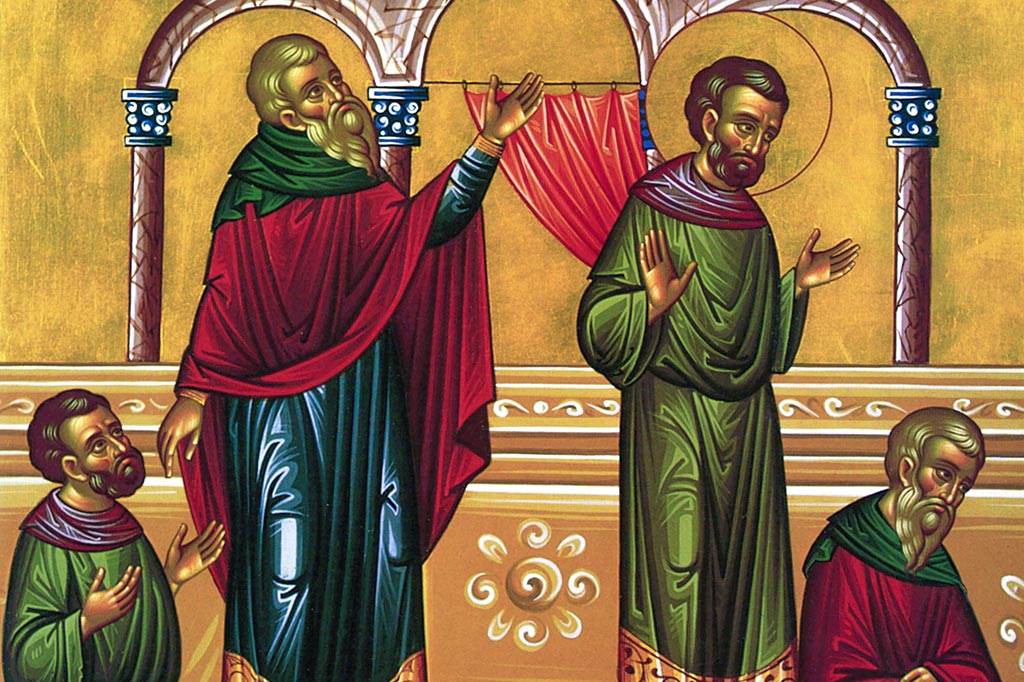By faith Moses, when he was grown up, refused to be called the son of Pharaoh’s daughter, choosing rather to share ill-treatment with the people of God than to enjoy the fleeting pleasures of sin. He considered abuse suffered for the Christ greater wealth than the treasures of Egypt, for he looked to the reward. And what more shall I say? For time would fail me to tell of Gideon, Barak, Samson, Jephthah, of David and Samuel and the prophets— who through faith conquered kingdoms, enforced justice, received promises, stopped the mouths of lions, quenched raging fire, escaped the edge of the sword, won strength out of weakness, became mighty in war, put foreign armies to flight. Women received their dead by resurrection. Some were tortured, refusing to accept release, that they might rise again to a better life. Others suffered mocking and scourging, and even chains and imprisonment. They were stoned, they were sawn in two, they were killed with the sword; they went about in skins of sheep and goats, destitute, afflicted, ill-treated— of whom the world was not worthy—wandering over deserts and mountains, and in dens and caves of the earth. And all these, though well attested by their faith, did not receive what was promised, since God had foreseen something better for us, that apart from us they should not be made perfect. Hebrews 11: 24-26, 32-40 (Epistle of the First Sunday of Lent)
The First Sunday of Lent is known affectionately as the “Sunday of Orthodoxy”. It is a day we remember the historical event of the returning of the icons to the churches in 843 after a nearly 150 year absence. The church spent nearly 150 arguing about whether icons constituted a violation of the second commandment that we are not worship graven images. The Seventh Ecumenical Council decreed in 787 that icons were in fact not a heresy but a help. And then it took nearly 60 more years until the matter was finally laid to rest. In most Orthodox Churches, there is a beautiful procession of icons on this Sunday.
Following the procession, there is a reading of a Synodic Statement, read every year on the Sunday of Orthodoxy since 843. The statement boldly proclaims Orthodoxy as the true expression of the faith, stating “This is the faith of the Apostles. This is the faith of the Fathers. This is the faith of the Orthodox. This is the faith on which the world is established.” (Synodikon, Sunday of Orthodoxy, Trans. by Fr. Seraphim Dedes)
Today’s Epistle to the Hebrews purposefully takes us back to the time before Christ, when people lived in expectation of the coming of the Messiah. An excellent definition of “faith” is too live in expectation and hope, but without complete understanding of what is coming. The major figures of the Old Testament—Moses, Gideon, Barak, Samson, Jephthah, David, Samuel and the prophets—all mentioned by name in the Epistle lesson, all had at least two things in common. First, all lived in faith. And second, all suffered in some way because of it.
Today’s Epistle reminds us that we too, are to live like these people. We are to live with faith—with hope, with expectation. Even if we don’t have full knowledge—and none of us has full comprehension of God, salvation or the future—we continue on in faith and hope and expectation of an eternal reward that God has promised for all those who believe in Him. If we live a sincere Christian life, at many points on the road to salvation, we are going to suffer. If one has never been questioned or criticized for their faith, one has to wonder how strong that faith is. Just like if one has never inspired someone else because of their faith, one has to wonder how strong that faith is. Because faith does bring a certain amount of criticism from others, but our faith also has the power to inspire others as well.
Those whom we read about in the Epistle lesson were able to do some pretty incredible things—“conquered kingdoms, enforced justice, received promises, stopped the mouths of lions, quenched raging fire, escaped the edge of the sword, won strength out of weakness, became mighty in war, put foreign armies to flight.” (Hebrews 11: 33-34) Through faith and through God’s mercies, we can do amazing things. God works through the faith of people and sometimes even through their lack of it.
It’s hard to have faith sometimes. Faith has its sorrows but also its rewards. If we really are going to be the faith “on which the WORLD is established,” this can only start when each of us upholds our own corner of the world with our own dedication to the Christian faith.
Moses, after a time of self-control, received the law and won over the people. Elias, in fasting, caused the closing of the heavens; and the three youths, descendants of Abraham, by fasting overcame the law-breaking tyrant. Through fasting make us also worthy, O Savior, to arrive at Your Resurrection, as thus we cry aloud, “Holy God, Holy Mighty, Holy Immortal, have mercy on us.” (Doxastikon from Matins, Sunday of Orthodoxy, Trans. by Fr. Seraphim Dedes)
Strengthen your faith so that God will work through you as well. Don’t listen to criticism for your faith. Instead focus on inspiring others through it.
